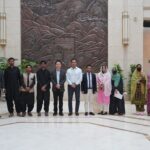By Hamid Khan Wazir
ISLAMABAD, Pakistan: The National Institute of Health (NIH) in Islamabad has started series of activities across the Country to promote awareness about antibiotic resistance among all sectors in collaboration with national and international partners as a part to celebrate Antimicrobials Resistance (AMR) week from November 18-24, 2020.
The World Health Organization (WHO) has promoted the World Antibiotic Awareness Week to be celebrated each year with the aim to increase global awareness of antibiotic resistance and its devastating effects on living beings.
The AMR occurs when bacteria, viruses, fungi, and parasites change over time and no longer respond to medicines making infections harder to treat and increasing the risk of disease spread, severe illness, and death.
As a result of drug resistance, antibiotics and other antimicrobial medicines become ineffective and infections become increasingly difficult or impossible to treat.
The NIH has planned and is implemented a series of activities across the country to sensitize the issue of AMR and to promote the correct usage of antibiotics across all fields in order to prevent further instances of antibiotic resistance.
The activities include AMR seminars, webinars of AMR Trends in Pakistan, video messages, AMR Poster competition to raise its awareness among children, Video production competition for university students, and article writing competition for all to enhance societal level awareness about current practices and ways to control misuse of antibiotics.
The Executive Director of NIH Professor Major General Aamer Ikram said, “It is collective responsibility of all stakeholder to combat with AMR catastrophe”. He emphasized on benefits and safe use of Anti-biotics and how its misuse is a real threat for all forms of lives on the earth. Under one health concept, this increasing concern is serious as there is excessive and unnecessary use of antibiotics in human, animal and agriculture fields. In our Country there is unnecessary use of antibiotics and over the counter sale of antibiotics is seen.”
“We are currently going through a pandemic COVID-19 and like COVID, the AMR is considered as Silent Pandemic”.
It is much needed to design strategies to overcome the injudicious and unnecessary use of antibiotics, he added.
The National Focal Person on AMR Dr. Muhammad Salman said that there is a need for coordination among all health stakeholders to work collectively on this issue.
Dr. Muhammad Salman said that XDR Typhoid in Hyderabad and Larkana in Sindh is not only a provincial problem but we consider it a threat for all the Country.
The government of Pakistan has developed a national action plan to control AMR in all sectors of society and it is time to take concrete measures to tackle AMR issue including XDR Typhoid outbreak with collective responsibility.







